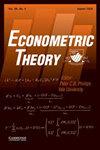函数依赖在空间计量经济学中的应用
IF 1
4区 经济学
Q3 ECONOMICS
引用次数: 0
摘要
在本文中,我们将时间序列(见 Wu [2005,美国国家科学院院刊 102,14150-14154])和静态随机场(见 El Machkouri、Volný 和 Wu [2013,随机过程及其应用 123,1-14])的函数依赖性(FD)概念推广到非静态空间过程。在空间计量经济学的传统设置中,我们定义了空间 FD 测量的概念,并建立了矩不等式、指数不等式、纳盖夫型不等式、大数定律和中心极限定理。我们证明了一些常见的空间计量经济模型,包括空间自回归(SAR)模型、阈值 SAR 模型和空间面板数据模型所产生的因变量在规则条件下是函数依赖的。此外,我们还研究了 FD 测量在各种变换下的特性,这在应用中非常有用。此外,我们将空间 FD 与 Jenish 和 Prucha([2009,《计量经济学杂志》150,86-98],[2012,《计量经济学杂志》170,178-190])提出的空间混合和空间近距依赖进行了比较,并说明了其优势。本文章由计算机程序翻译,如有差异,请以英文原文为准。
APPLICATIONS OF FUNCTIONAL DEPENDENCE TO SPATIAL ECONOMETRICS
In this paper, we generalize the concept of functional dependence (FD) from time series (see Wu [2005, Proceedings of the National Academy of Sciences 102, 14150–14154]) and stationary random fields (see El Machkouri, Volný, and Wu [2013, Stochastic Processes and Their Applications 123, 1–14]) to nonstationary spatial processes. Within conventional settings in spatial econometrics, we define the concept of spatial FD measure and establish a moment inequality, an exponential inequality, a Nagaev-type inequality, a law of large numbers, and a central limit theorem. We show that the dependent variables generated by some common spatial econometric models, including spatial autoregressive (SAR) models, threshold SAR models, and spatial panel data models, are functionally dependent under regular conditions. Furthermore, we investigate the properties of FD measures under various transformations, which are useful in applications. Moreover, we compare spatial FD with the spatial mixing and spatial near-epoch dependence proposed in Jenish and Prucha ([2009, Journal of Econometrics 150, 86–98], [2012, Journal of Econometrics 170, 178–190]), and we illustrate its advantages.
求助全文
通过发布文献求助,成功后即可免费获取论文全文。
去求助
来源期刊

Econometric Theory
MATHEMATICS, INTERDISCIPLINARY APPLICATIONS-STATISTICS & PROBABILITY
CiteScore
1.90
自引率
0.00%
发文量
52
审稿时长
>12 weeks
期刊介绍:
Since its inception, Econometric Theory has aimed to endow econometrics with an innovative journal dedicated to advance theoretical research in econometrics. It provides a centralized professional outlet for original theoretical contributions in all of the major areas of econometrics, and all fields of research in econometric theory fall within the scope of ET. In addition, ET fosters the multidisciplinary features of econometrics that extend beyond economics. Particularly welcome are articles that promote original econometric research in relation to mathematical finance, stochastic processes, statistics, and probability theory, as well as computationally intensive areas of economics such as modern industrial organization and dynamic macroeconomics.
 求助内容:
求助内容: 应助结果提醒方式:
应助结果提醒方式:


